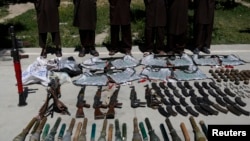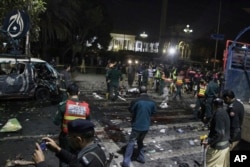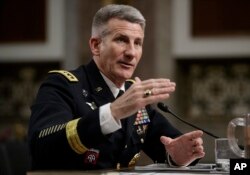Pakistan has sharply reacted to recent criticism and assertions by U.S. congressmen, the U.S. military and Washington-based, influential think tanks blaming the country for the worsening security situation in Afghanistan and calling for President Donald Trump to toughen his approach toward Islamabad for harboring the Taliban and its ally, the terrorist Haqqani network.
Pakistani Foreign Ministry spokesman, Nafees Zakaria, told VOA the criticism is misplaced and does not take into account massive human and economic losses his country has suffered in the fight against terrorist groups.
Zakaria cited Monday’s deadly suicide bombing in the eastern city of Lahore as the latest reaction to Pakistan’s resolve against terrorism. The attack left at least 13 people dead and nearly 90 wounded.
“These are the things which reflect that how Pakistan has been suffering and these kind of incidents make Pakistan more determined and resolute in our drive against terrorist elements. We do not draw any distinction while taking on the terrorist elements,” he maintained.
'Taliban sanctuaries in Pakistan'
While testifying before a U.S. Armed Services Committee hearing on Afghanistan last week, General John Nicholson, the commander of international forces in the country, called for “a holistic review” of Washington’s relations with Islamabad to pressure the country to end Taliban sanctuaries on Pakistani soil.
Chairperson, Senator John McCain, and other members of the committee echoed Nicholson’s words, emphasizing the need for eliminating the external insurgent sanctuaries and evaluation of the relationship with Pakistan.
“We are actually disappointed with some of the assertions and insinuations made in the recent discussions in Washington about terrorist safe havens in Pakistan that we feel are misplaced and are not in sync with the current situation on the ground,” lamented Zakaria.
Complex situation
He noted that the discussions spoke of a multiplicity of military and non-military factors contributing to the existing stalemate in Afghanistan.
“Therefore, singling out Pakistan and pinning the entire blame on Pakistan for the situation in Afghanistan is neither fair nor accurate, nor is it borne out by the ground realities,” warned Zakaria.
He reiterated that Afghan stability is in the interest of his country and Pakistan remains committed to work with the Kabul government “to make 2017 a year of cooperation” for regional peace and security.
Afghan leaders have welcomed calls from General Nicholson and U.S. congressmen for putting pressure on Pakistan to cut ties to the Taliban insurgency.
“This is very encouraging to hear. Because you cannot talk about the state of security in Afghanistan without talking about the state of terrorist heavens and support provided by Pakistan. The two are intrinsically connected,” asserted Hamadullah Mohib, the Afghan ambassador to Washington. He was delivering a public talk at New America think tank on Monday.
Pakistan optimistic about Trump
Pakistan’s Zakaria, however, sounded upbeat about improved ties with the U.S. under President Donald Trump, saying the countries have enjoyed a longstanding relationship.
“We are cooperating in a number of areas, particularly the security cooperation between the two countries has been going on for quite sometime and one of the important elements of the security cooperation is in the counterterrorism,” he said.
Trump has spoken little about exactly how he wants to deal with the longest American war in Afghanistan and whether he would adopt a hardline in dealings with Pakistan.
New Defense Secretary Jim Mattis, during his Senate Confirmation hearing, emphasized the need for remaining engaged with Pakistan to rebuild mutual trust.
Mattis also spoke by telephone with Pakistan army chief, General Qamar Javed Bajwa, last Thursday and expressed support for his military’s counterterrorism role in a conversation that lasted for 20 minutes, according to an official Pakistani statement.
General Bajwa reiterated Pakistan’s commitment to counter all militant groups operating in its territory, according to a Pentagon statement.






